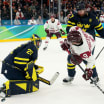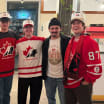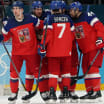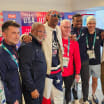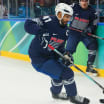NHL.com's Q&A feature called "Five Questions With…" runs every Tuesday. We talk to key figures in the game and ask them question to gain insight into their lives, careers and the latest news.
The latest edition features Amrit Gill, digital content coordinator and host on "Hockey Night in Canada: Punjabi Edition."
Five Questions with Amrit Gill
'Hockey Night in Canada: Punjabi Edition' host discusses Gender Equality Month, her passion project

For Amrit Gill, her job is much more than that.
Five years ago, Gill became the first woman on "Hockey Night in Canada: Punjabi Edition." And as the NHL celebrates Gender Equality Month in March, Gill hopes the work she's doing makes it easier for other women to join the profession.
"It's special hearing that I'm the first woman with Punjabi] and it's great to know that, but at the same time it's like, really it took that long?" Gill said. "It's special because it's more than a job and it's become a passion project. It comes with a degree of certain responsibility to make it better for the next women in line and for the next generation. So, it's not only a job, it's a responsibility."
According to the Office of the Commissioner of Official Languages, Punjabi is the
[fifth-most common language
spoken in Canada (behind Cantonese, Mandarin, French and English). Hockey is enjoyed by many men and women from different backgrounds, and Gill would like to see that represented more on the screen.
Making hockey happen with Amrit Gill
"How many women can you count right now who are from a diverse background? That are women of color that are on screen as sports reporters? As analysists? I can barely think of any in Canada. We celebrate the progress, but it's almost like a game of catch-up. Until we say we have organizations that reflect our audience, we're still playing catch-up."
Here are Five Questions with… Amrit Gill.
What does Gender Equality Month mean to you?
"It's a time to recognize the progress that's been made for women to reach their full potential. But it's also time to have uncomfortable discussions and hold each other accountable and ask, what are we doing on a daily basis that will amount to lasting change, so that females who eventually make up half the world's population can have the same, fair equal opportunities as their male counterparts. While now we may have more opportunities compared to my mom's generation, it's not enough and we need to be OK vocalizing that.
"One of my favorite quotes [from Billie Jean King] is, 'Everyone thinks women should be thrilled when we get crumbs. But I want women to have the cake, the icing and the cherry on top, too.' Until we start being more comfortable with the idea of becoming more content with reaching for more, we still have more work to do."
When you were growing up near Vancouver, British Columbia, was hockey always the sport you loved?
"That was the sport growing up. My father, when he immigrated here [from India], hockey was a way to connect to the community and create friendships he didn't have by being able to bring up the highlights from last night's game. We always had it on in our household growing up. It wasn't until I started watching Hockey Night Punjabi that I started connecting more with my family and I saw them connecting with the larger society.
"My grandmother, hockey's on [in English], and the only words she really knew were penalty and goal. And it wasn't until she started watching Hockey Night [Punjabi] that she would be able to totally understand the game and she was able to converse about it. The game has given so much to me personally in regard to helping my family connect with the community and being able to strengthen my relationship with my grandmother, that I want to be able to give back. It's a passion project, essentially. And now I have a role that provides me with a platform to grow the game. This game has given me so much, and it's a sense of fulfillment that comes with it. and I recognize it's more than just stats and analysis. It's just about connecting with the community and connecting community with the sport. It's pushing social change, really."
You mentioned that you see your work as a job and a responsibility. How much do you enjoy bringing hockey to the Punjabi audience?
"It's a very, very fun job, but I think it wasn't until the third season that I felt like a full-fledged member of the team. And that was because I had the encouragement and fantastic leadership from mentors in the building, my producer, my colleagues who urged me to pursue something new. And they trusted me in taking the work on. Those mentors were men, and until men start stepping up and understanding that investing in women isn't a risk, it's a reward that keeps on giving, we're not going to be able to reach our full potential.
"I guess what I'm trying to say is, as organizations we want to reflect our audience. We want to have diverse people, we want to have people from visible minorities, men and women, gender parity essentially. It's a lot of fun, but I really just view it as a responsibility and a privilege and I'm lucky to have a platform that allows me to create a more inclusive, diverse narrative for the sport."
Have you gotten a great response from girls and women with what you've been doing?
"I mean, the response overall has been fairly positive. But I think in regard to women in the business, yes, I'm happy to see more women in the business because it shows progress. And I commend those who have made changes. But until the work force starts looking like a representation of the audience, there's more work to be done. I haven't had many girls be like, 'yeah, I want to do that,' because, they don't see themselves on screen as much, right? But we need leaders to push; more women need to be part of this business, and women from different backgrounds. I would love to say, yeah, positive feedback, tons of girls are saying I want to do this. But there's more work to be done."
We see women's progress in some areas. We see how women's hockey is growing, and Cammi Granato becoming the NHL's first female pro scout with Seattle. Are you encouraged by the big picture?
"Yeah, I would say I'm encouraged by the big picture and those in charge are understanding. But this shouldn't be viewed as a goal. It should almost become mandatory that more women are in the business. Women are stepping up to the plate. They've been ready to step up to the plate. But until we have leaders that understand investing in a woman is a reward, we're not going to be able to see change."



